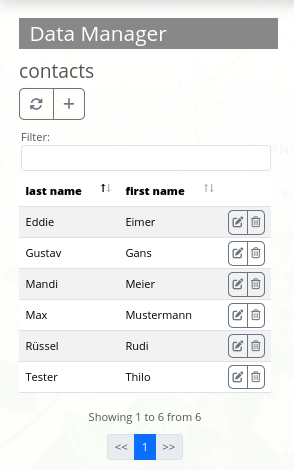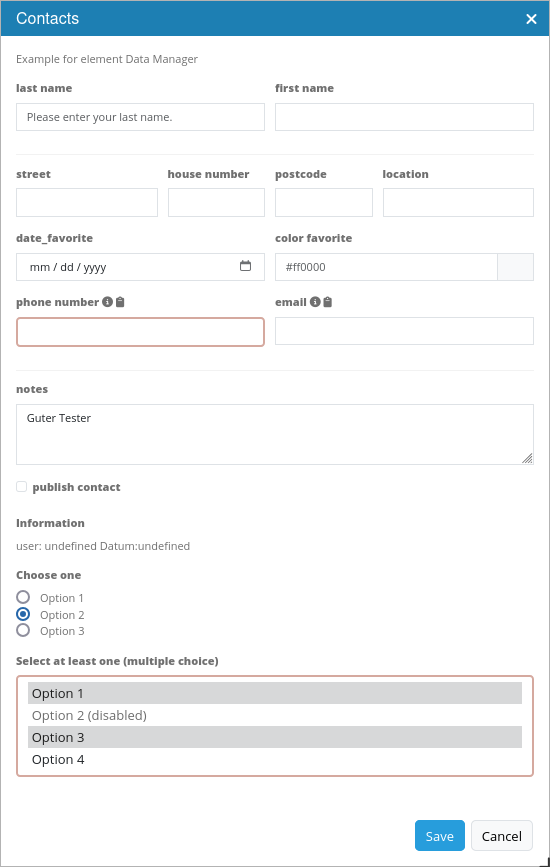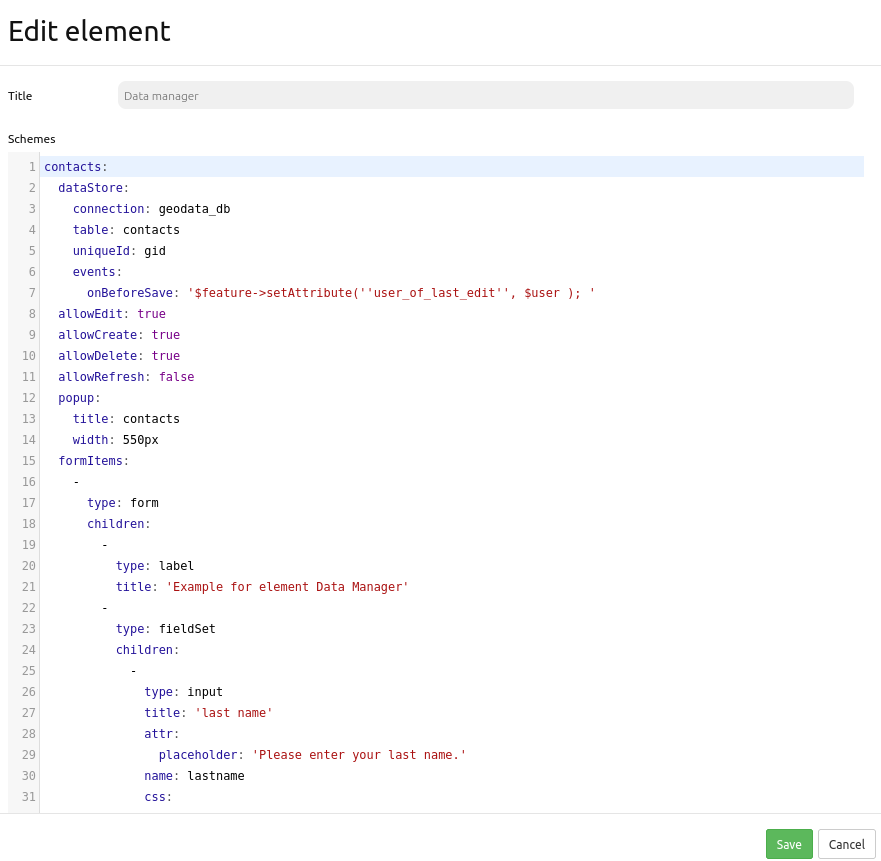Data Manager
The element Data Manager is similar to the Digitizer. However, Data Manager only works with nonspatial data, i. e. you can not create geometries. Data Manager can be used to maintain reference tables, for example a table with contact information.
Configuration
Data Manager needs access to a database where the editable tables are. You have to define a new database configuration to be able to connect with. Read more about this under YAML Configuration (Configuration and Application files).
Configuration example
The definition of the Data Manager is done in YAML syntax in the textarea configuration at schemes. Here you define the database connection, the editable tables, the attribute form.
Hint
If errors occur in the database, fields or form, various error messages will appear. Here, the productive environment will only give a general error message. If you want to see the exact error, you should call the page as development environment. Find more under en/quickstart:Start Mapbender in a productive environment.
Data Manager is a good solution to store simple contact information in Mapbender:

In the example, an input template is opened after clicking  .
.

SQL for the contact table
The following SQL commands must be executed in your database to create the contact table for the example.
CREATE TABLE public.contacts (
gid serial PRIMARY KEY,
firstname varchar,
lastname varchar,
street varchar,
housenumber varchar,
postcode integer,
location varchar,
phone varchar,
email varchar,
notes varchar,
public boolean,
date_of_creation date DEFAULT date(now()),
user_of_last_edit varchar,
date_favorite date,
color_favorite varchar
);
Element configuration
Afterwards, the element can be embedded into the sidepane.

YAML-Definition
You can find the necessary YAML code of the configuration example below:
contacts:
dataStore:
connection: geodata_db
table: contacts
uniqueId: gid
events:
onBeforeSave: '$feature->setAttribute(''user_of_last_edit'', $user ); '
allowEdit: true
allowCreate: true
allowDelete: true
allowRefresh: false
popup:
title: contacts
width: 550px
formItems:
-
type: form
children:
-
type: label
title: 'Example for element Data Manager'
-
type: fieldSet
children:
-
type: input
title: last name
attr:
placeholder: 'Please enter your last name.'
name: lastname
css:
width: 50%
-
type: input
title: 'first name'
name: firstname
css:
width: 50%
-
type: breakLine
-
type: fieldSet
children:
-
type: input
title: street
name: street
css:
width: 30%
-
type: input
title: 'house number'
name: housenumber
css:
width: 20%
-
type: input
title: postcode
name: postcode
css:
width: 20%
-
type: input
title: location
name: location
css:
width: 30%
-
type: fieldSet
children:
-
type: date
title: date_favorite
name: date_favorite
css:
width: 50%
-
type: colorPicker
title: color favorite
name: color_favorite
attr:
placeholder: '#ff0000'
css:
width: 50%
#-
# type: breakLine
-
type: fieldSet
children:
-
type: input
title: phone number
name: phone
mandatory: true
mandatoryText: 'Please add your phone number.'
infoText: 'Help: Please add your phone number.'
copyClipboard: true
css:
width: 50%
-
type: input
title: email
infoText: 'Help: Please add your e-mail.'
copyClipboard: true
placeholder: 'Please enter your e-mail.'
name: email
css:
width: 50%
-
type: breakLine
-
type: textArea
title: notes
placeholder: 'You can leave notes here.'
name: notes
value: 'Guter Tester'
-
type: checkbox
name: public
value: true
title: 'publish contact'
-
type: text
title: 'Information'
text: "'user: ' + data.user_of_last_edit + ' Datum:' + data.date_of_creation\n"
- type: radioGroup
title: Choose one
name: choice_column_1
options:
- label: Option 1
value: v1
- label: Option 2
value: v2
- label: Option 3
value: v3
value: v2 # Pre-select second option by default for new items
- type: select
title: Select at least one (multiple choice)
attr:
required: required
multiple: multiple
name: choice_column_2
options:
- label: Option 1
value: v1
- label: Option 2 (disabled)
value: v2
attr:
disabled: disabled
- label: Option 3
value: v3
- label: Option 4
value: v4
value: v1,v3 # use comma-separated values for default multi-select value
table:
autoWidth: false
columns:
-
data: lastname
title: last name
-
data: firstname
title: first name
info: true
lenghtChange: false
ordering: true
pageLength: 10
paging: true
processing: true
searching: true